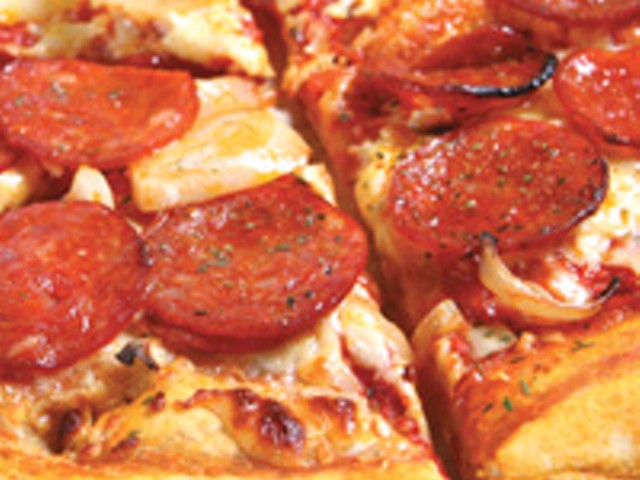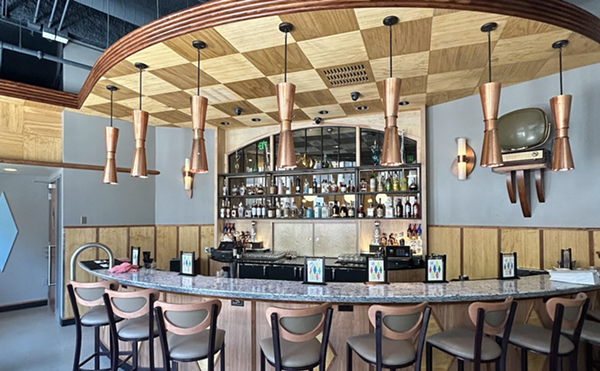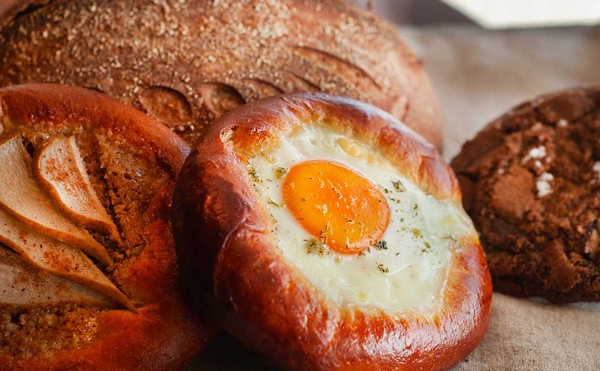German restaurants in our area — indeed in most areas — are few and far between, especially when you compare their number to that of Italian and Chinese eateries, which offer the two most popular ethnic cuisines in the United States. This culinary gap relates to the notion that traditional German fare cannot achieve the subtlety and variety of many other national cuisines. And, of course, it is difficult for calorie-conscious diners to find suitable fare in a German restaurant.
Nonetheless, now that there is a chill in the air, it might be a good time to sample hearty Teutonic standards served at the venerable Richter's Chalet one block east of Telegraph on Michigan in Dearborn. German-born Roland Richter Sr. founded his half-timbered restaurant 37 years ago and still serves as baker and pastry chef. His son, Roland Jr., is in charge of the kitchen, where he makes virtually everything from scratch. Many of their servers have been around almost as long — and even longer. Eighty-four-year-old Loretta Livernois-Novack began waiting tables in 1953 at Hoppe's, Richter's predecessor in the same building. She continues to appear on Saturday nights to handle a few tables just for old-times' sake.
The chalet, which seats 150, is composed of two rooms with walls crammed full of German travel posters, paintings, steins and provincial plaques, which, with canned oom-pah music, suggests the gemütlichkeit of a bierstube. However, for 36 years, it wasn't quite a bierstube, since Richter's did not have a liquor license. Now, it offers six wines ($24), one of which comes from Germany, and several beer options, highlighted by a 16-ounce schooner of Franziskaner wheat beer on draft, imported from Munich ($4.50). The unusually shaped schooner is also an import.
One of the two rooms near the busy kitchen and cash register contains bare-surfaced booths lining the walls and several tables covered with white cloths. The other room, a bit more formal, is all white tablecloths. The complimentary amuse-bouche is Ritz crackers covered with a house-made cheddar-cheese spread.
The dozen German dinners, supplemented by several daily specials, including soup or salad, average around $12. There is little need to order appetizers but how can one resist crispy fried sauerkraut bites that resemble hush puppies filled with essence of kraut? As for the soup or salad that comes with, the simple iceberg-based salad is unremarkable. A better option is the coleslaw, which is of the vinegary and not creamy variety, or the slightly bitter but tangy beer-cheese soup. Over several weeks, Roland Jr., offers three different soups a night from his repertoire of 47!
The accoutrements that accompany the main courses are special. Here, the red cabbage, sauerkraut and, especially, warm German potato salad significantly enhance the mains. Moreover, Roland Sr.'s warm homemade mini-bread loaf is unusual. It contains a distinctive seasoning that belies its disappointing visual impression as merely an ordinary fluffy white bread. Alas, despite my prying, the ingredients remain a house secret.
As expected, most of the German entrées are rather heavy. Austrian sauerbraten, composed of relatively tender marinated beef tenderloin smothered in a sweet and sour sauce, is a solid choice. But like several of the other dishes, the sauce may be too all-encompassing. Instead, ask for it on the side to apply as you wish.
That is certainly the case with jaeger schnitzel, where the dense mushroom sauce could overwhelm the somewhat chewy sautéed veal. The veal comes with two butter dough half-moons and a half pear sprinkled with cranberry sauce.
Among other schnitzels are breaded Wiener and applesauce, Victoria sautéed with ham and Swiss cheese, and Holstein garnished with a fried egg, anchovies and capers.
Kassler rippchen, two thin center cuts of smoked pork loin, is suitably charred if a bit dry. Chicken or veal cordon bleu, knackwurst, bratwurst, rindsoulade and beef Wellington round out the entrées.
If that is not enough variety, you can wander to the American side of the menu for steaks, Southern fried chicken, baked flounder, lake perch, rainbow trout and the like, all, again, very reasonably priced. And if you drop in on a Tuesday or Thursday you can score kartoffel reibekuchen, a potato-pancake dinner ($8.95-$9.85) with applesauce, sour cream or bacon.
The desserts, none of which cost more than $3, are another one of Richter's strengths. Chocolate cheesecake, hazelnut raspberry torte, and the classic schwarzwaelder kirsch torte (Black Forest cherry) are executed well. And all eight of them are made in-house, a rarity these days — even at upscale establishments.
Richter's Chalet is a throwback to those days before the Food Network, celebrity chefs, Neiman Ranch and Maytag blue cheese allegedly transformed American gourmands into gourmets. And its price structure also recalls another era when two people could enjoy dinner and drinks for $40. To be sure, classic German cuisine is anything but trendy. But Richter's Chalet offers an opportunity to return to a simpler gastronomic era, albeit with the sort of calorie-laden and artery-clogging grub that calls for some extra hours at the gym.
Mel Small teaches history at Wayne State University. Send comments to [email protected].





